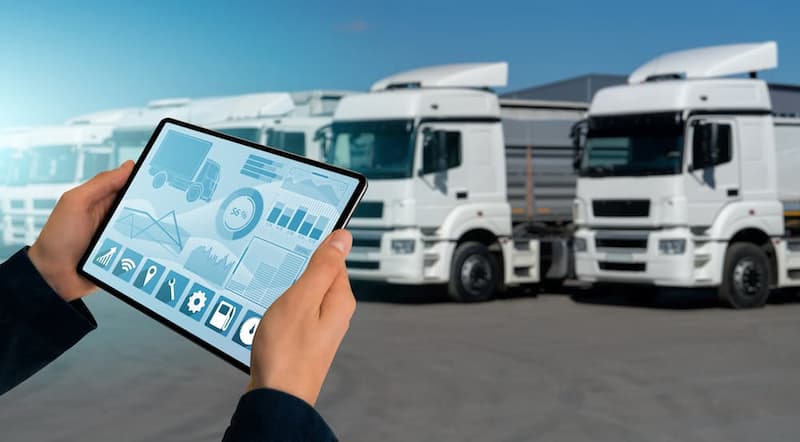How Technology Can Reduce Costs For Your Fleet
Fleet managers are always looking for new ways to optimise their working processes and get the most out of their fleet. Fuel is the most valuable resource a fleet manager needs to monitor, and they must ensure it is being used efficiently and not wasted.
New fuel management technology is helping to change how fleet managers handle their fleets’ fuel consumption. Fortunately, with various technological improvements, many digital tools are available for managers to assist them in this goal, such as telematics, tracking metrics and fuel usage monitoring.

What is Telematics?
Telematics is a combination of the two words telecommunications and informatics. An easier way to think of it is to consider blending computers and wireless technology to share data over a vast network. This may sound like a paraphrase of the internet, but telematics is a private service that can be localised to specifically your vehicle fleet. The US military originally developed telematics, but it wasn’t long before this useful technology was implemented in vehicle fleets worldwide.
The role of telematics is to share the data, but the goal of telematics is to improve your services. This can be through various means, such as reducing costs through efficient vehicle usage, limiting environmental impact and even improving road safety when working around the public. Telematics is widely employed in fleets as a way of tracking vehicles. It is most commonly applied through an onboard GPS.
Fuel Efficiency Through GPS
With rising fuel costs, it’s vital that each fleet manager persistently seeks out new ways of improving their fuel efficiency, such as our online fuel management software solutions. One of the most cost-effective methods currently employed is GPS fleet tracking. This system is a highly effective method for providing a sizable return on your investment and reducing those margins. How GPS tracking achieves these positive results is through:
Minimising engine idling, thereby significantly saving fuel consumption. This has the additional benefits of reducing harmful emissions and extending the engine’s life. However, an idling engine will prematurely age an engine. With a GPS tracking system installed, fleet managers can receive reports of when the engine is on but the vehicle is not moving, alerting them to wasted engine idling.
Monitoring Speed. With the high demand for fast deliveries, too many drivers will attempt to skirt speed limits in order to arrive at their destination as early as possible. Apart from being illegal and dangerous, this will burn fuel less efficiently. GPS systems can alert fleet managers to drivers moving at excessive speeds and help their fleet maintain safe, efficient driving.
Optimised routes. This is the most obvious use for a GPS in a vehicle fleet. Simply ensuring that drivers complete their journeys by the most direct route, without getting lost or accidentally taking a long way around, will significantly save on your fuel consumption.
Preventative maintenance. Healthy engines will work far more efficiently than worn engines. Machines that do not receive regular maintenance will lose their fuel efficiency and potentially break down, leading to wasted time. A GPS can provide data essential for your other tracking metrics (explained below) as it can track the mileage your vehicle has travelled since its last maintenance.
Embrace Tracking Metrics
While telematics and GPS will provide you with essential data you need on your fleet performance, it’s important to use a variety of metrics to analyse that data and reach an accurate conclusion.
Effective maintenance is essential for the consistent performance of your fleet and maintaining an efficient level of fuel consumption. In addition, maintenance metrics are the best way to take your telematics data and apply it practically to your fleet. Using preventative maintenance and daily vehicle inspection reports as maintenance metrics will allow you to keep a close eye on the state of your fleet. The better form your fleet is in, the more efficient is its fuel usage.
Using driver and asset metrics on your GPS data is another excellent way of optimising your fuel usage. In addition, these performance style metrics apply to the previously mentioned telemetrics about speeding and engine idling. By monitoring these, you can improve your fuel efficiency significantly.
Cost metrics are the ones most applicable to reducing costs for your fleet. These metrics will monitor your fleet’s expenses, with fuel being the most significant expense. The best way to embrace cost metrics is by investing in a professional fuel management system.
If you’d like to learn more about valuable metrics for vehicle fleets, please read our other blog on metrics for fleet managers, where we go into greater detail.
Benefits Of On-Site Fuel Monitoring
Fuel management and monitoring are essential tools for saving your fleet money. Fuel monitoring is designed to assist you with keeping track of your fleet’s fuel usage. When combined with a fuel management system, you can see what’s happening and gain complete control over how it’s used.
At Fueltek, we specialise in fuel management systems and solutions. We can attest to the benefits of these technological solutions, primarily when used in conjunction with on-site fuel storage tanks. For example, our popular complete fuel management package allows fleet managers to benefit from a personal on-site fuel station. This eliminates the need for drivers to find fuel stations and will enable you to buy fuel in bulk for less, thereby saving money.
Our expert team can significantly provide your fleet with everything you need to decrease fuel costs. You can take complete control of your fleet fuel usage by combining on-site fuel storage, computerised terminals, and our fuel monitoring software.
If you are interested in improving the efficiency of your fleet and reducing expenses, please browse our list of fuel management, monitoring and storage solutions for more details. Or, if you need assistance deciding the best solution for your fleet, contact us directly, and a member of our team will answer all your questions.










